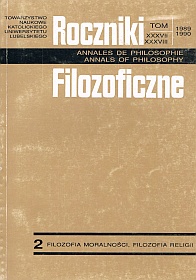Problem odnowy teologii moralnej w ujęciu Enrica Chiavacciego
Abstrakt
The paper presents and criticizes Enrico Chiavacci's standpoint concerning, generally speaking, the attitudes of morality which attitudes are to be the foundation of the new manner of pursuing moral theology. According to the author it was, first of all, the results of particular sciences that questioned the verypossibility of morality. On the one hand, they seem to question the possibility of freedom which freedom is the foundation of morality. On the other hand, they question the existence of the absolute criterion of morality. In keeping with the first matter, the author thinks that modern science has yet not dismissed man's freedom, though he defended this thesis at the expense of some groudless resignation from the rootedness of freedom in cognition. The second problem, though, is at the centre of Chiavacci's interest. He accepts a thesis which thesis cannot be sustained, and which some representatives of particular sciences put forward. It is the thesis of a social and cultural conditioning of our cognition. In the light of this thesishe criticizes various possible forms of grounding the absolute moral norm of morality, including the well-known thesis in Thomistic ethics which thesis "sees" this norm in human nature. The epistemological thesis which Chiavacci assumed (and which thesis leads to his questioning, among others, the possibility of the existence of absolute norms, modification of the sense of natural law etc.) is not, however, consequently applied by him. Since he, as it were, gives it up (because of some unknown reasons, in the light of accepted assumptions) in his, roughly described, positive proposal of grounding the absolute criterion of morality on "the experience of basic values" and also on the reading out of Revelation.
Copyright (c) 1990 Roczniki Filozoficzne

Utwór dostępny jest na licencji Creative Commons Uznanie autorstwa – Użycie niekomercyjne – Bez utworów zależnych 4.0 Międzynarodowe.





